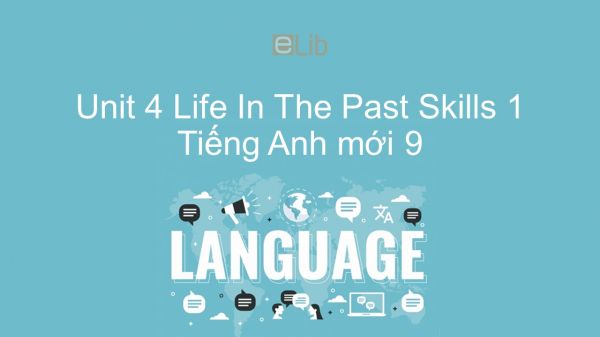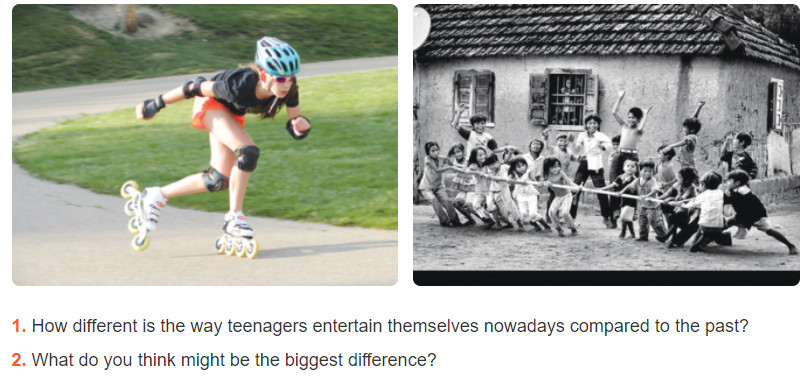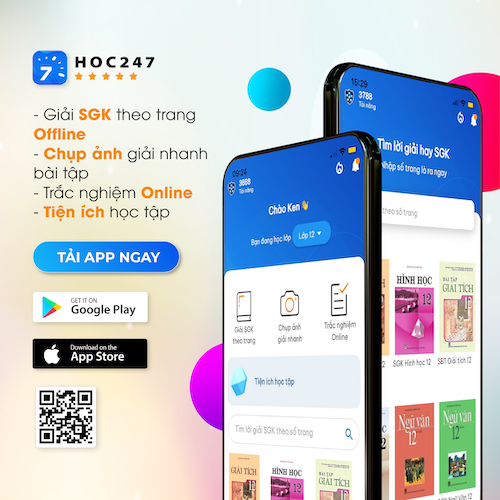Unit 4 lớp 9: Life In The Past - Skills 1
Bài học Unit 4 lớp 9 mới phần Skills 1 giúp các em luyện tập hai kĩ năng chính là Reading và Speaking, luyện tập trả lời câu hỏi và ghi nhớ các từ vựng. Mời các em cùng tham khảo!
Mục lục nội dung

Unit 4 lớp 9: Life In The Past - Skills 1
1. Reading
1.1. Task 1 Unit 4 lớp 9
Think (Nghĩ)

Tạm dịch:
1. Giới trẻ ngày nay giải trí khác như thế nào so với ngày xưa?
2. Sự khác biệt lớn nhất theo bạn là gì?
Guide to answer
1. In the past, teenagers preferred physical activities and used to play with handmade toys; there were not high technology devices like computer, video game or smartphone for entertainment. Nowadays, teenagers have more choices for entertainment than in the past; they enjoy many kinds of sport or spending time watching television, listening to music, playing online games or using social network.
2. I think the biggest difference is that teenagers used to take part in more physical activities than today.
Tạm dịch:
1. Trước đây, thanh thiếu niên thích các hoạt động thể chất và thường chơi với đồ chơi thủ công; cũng không có các thiết bị công nghệ cao như máy tính, trò chơi điện tử hoặc điện thoại thông minh để giải trí.
Ngày nay, thanh thiếu niên có nhiều sự lựa chọn để giải trí hơn so với trước đây; họ thích nhiều môn thể thao hoặc dành thời gian xem tivi, nghe nhạc, chơi game trực tuyến hoặc sử dụng mạng xã hội.
2. Tôi nghĩ rằng sự khác biệt lớn nhất là thanh thiếu niên đã tham gia nhiều hoạt động thể chất hơn ngày nay.
1.2. Task 2 Unit 4 lớp 9
Read the conversation between Phong and his mother, and answer the questions. (Đọc đoạn hội thoại của Phong và mẹ cậu ấy, và trả lời các câu hỏi)
Phong: Mum, How did you use to entertain yourself when you were a teenager?
Mother: Well, kids in my days did a lot of physical activities in the fresh air: playing football, riding bikes, flying kites... We used nature as our playground. We also spent a lot of time with each other, playing and talking face to face, not on a screen like today.
Phong: It sounds nice, actually.
Mother: Yes. And this lifestyle kept us healthy and in shape. We didn't know about obesity. Girls didn't worry about getting fat and going on a diet.
Phong: Didn't you eat out with your friends?
Mother: No, we mostly ate at home. Sometimes we just had a snack from a street vendor.
Phong: I like street food. And did you watch much TV?
Mother: Only wealthy households had a TV. Instead, we read a lot. Unlike watching television, you had to use your imagination when you read. Ah! Now I remember - I used to keep a diary.
Phong: A diary? What did you write in it?
Mother: Lots of things: events, feelings, my private thoughts... you know.
Phong: Nowadays we just post them on Facebook.
Mother: I know. Life has changed so much, my darling.
Tạm dịch:
Phong: Mẹ, mẹ đã làm thế nào để tự giải trí khi còn trẻ?
Mẹ: Oh, những đứa trẻ thời của mẹ đã có nhiều hoạt động thể chất trong không khí trong lành: chơi bóng đá, đạp xe đạp, thả diều ... Bọn mẹ thường sử dụng thiên nhiên như một sân chơi . Bọn mẹ cũng dành rất nhiều thời gian với nhau, chơi đùa và nói chuyện trực tiếp, không phải trên màn hình máy tính như ngày nay.
Phong: Ôi tuyệt thật.
Mẹ: Đúng vậy. Và lối sống này giữ cho chúng ta sức khỏe và không thừa cân. Bọn mẹ không biết về bệnh béo phì. Các cô gái không lo lắng về việc béo phì và ăn kiêng.
Phong: Mẹ không đi ăn ngoài với bạn bè của mẹ sao?
Mẹ: Không, chủ yếu bọn mẹ đã ăn ở nhà. Đôi khi chỉ ăn vặt lề đường một chút thôi.
Phong: Con thích thức ăn đường phố. Và mẹ có xem nhiều TV không?
Mẹ: Chỉ có gia đình giàu có mới có TV. Thay vào đó, mẹ đã đọc rất nhiều. Không giống như xem truyền hình, con phải sử dụng trí tưởng tượng khi đọc. Ah! Bây giờ mẹ mới nhớ ra - mẹ đã từng lưu một cuốn nhật ký.
Phong: Một cuốn nhật ký? Mẹ đã viết gì trong đó?
Mẹ: Rất nhiều thứ: các sự kiện, tình cảm, những suy nghĩ riêng tư của mẹ ... con biết đấy.
Phong: Ngày nay chúng con chỉ đăng chúng lên Facebook.
Mẹ: Mẹ biết. Cuộc sống đã thay đổi rất nhiều, Con yêu.
Guide to answer
1. Where did teenagers in the past use to play? (Thanh thiếu niên trong quá khứ thường chơi ở đâu?)
=>They used to play outdoors, in the fresh air. (Họ thường chơi ở ngoài trời và không khí trong lành.)
2. How did they communicate with each other? (Họ đã liên lạc với nhau như thế nào?)
=> They met and talked face-to-face. (Họ gặp và nói chuyện trực tiếp.)
3. What was the advantage of this lifestyle? ( Lợi thế của lối sống này là gì?)
=> It kept them healthy and in shape. (Nó giúp họ khỏe mạnh và thể chất.)
4. Where did they mostly eat? (Họ ăn ở đâu?)
=> At home. (Ở nhà.)
5. What did Phong's mother say about reading? (Mẹ của Phong nói gì về việc đọc sách?)
=> You had to use your own imagination. (Con phải thường dùng trí tưởng tượng.)
6. Did teenagers in the past publicise their emotions? (Có phải thanh thiếu niên trong quá khứ công bố công khai cảm xúc của họ?)
=> No, they didn't. (Không, họ không công khai.)
2. Speaking
2.1. Task 3 Unit 4 lớp 9
Discuss in groups: What do you think at teenagers' pastimes in 2? (Thảo luận theo nhóm rồi cho biết: Bạn nghĩ gì về các trò tiêu khiển của thanh niên ngày xưa theo như bài 2? )
Example
Pastime: riding a bicycle
Response A: I love it. I wish I could do it more often.
Response B: I think it’s inconvenient, especially when it rains. I prefer a fitness centre.
Tạm dịch:
Thời gian rảnh: đạp xe đạp
A: Tôi thích nó. Tôi ước tôi có thể làm vậy thường xuyên hơn.
B: Tôi nghĩ nó rất thuận tiện, đặc biệt là khi trời mưa. Tôi thích đến trung tâm thể dục.
Guide to answer
1. doing physical activities in the fresh air
A: I like it because it's good for our health
B: I can't get up early to do exercise.
Tạm dịch:
Tập thể dục trong không khí trong lành
A: Tôi thích vì nó tốt cho sức khỏe
B: Tôi không thể dậy sớm để tập thể dục
2. keep a diary:
A: I don’t like writing a diary because it can be easily read and someone can find out your secrets.
B: You can meet your friends and talk face -to - face when you want to share something.
Tạm dịch:
Viết nhật kí
A: Tôi không thích viết nhật ký vì nó có thể dễ đọc và ai đó có thể tìm ra bí mật của bạn.
B: Bạn có thể gặp gỡ bạn bè của mình và nói chuyện trực tiếp khi bạn muốn chia sẻ điều gì đó.
3. flying kites:
A: I think it’s interesting. I wish I could try it once.
B: Great. But we must find an open place for kites in order not to be stuck in electricity lines.
Tạm dịch
Thả diều
A: Tôi nghĩ nó rất thú vị. Tôi ước tôi có thể thử nó một lần.
B: Tuyệt quá. Nhưng chúng ta phải tìm một nơi không gian mở cho diều để không bị mắc kẹt trong đường dây điện.
4. reading
A: I really like reading books. It’s good that children spend more time reading than watching television or using computer.
B: I find it boring to read.
Tạm dịch
Đọc sách
A: Tôi thực sụ thích đọc sách. Nó tốt cho trẻ em hơn là xem TV hay dùng máy tính.
B: Tôi thấy đọc sách rất chán
2.2. Task 4 Unit 4 lớp 9
Work in groups.
What do you think about these habits which have been long practised by children in Viet Nam? Would you like to preserve the" Why/Why not?
(Làm việc theo nhóm. Bạn nghĩ gì về những thói quen sau của trẻ em ở Việt Nam? Bạn có muốn giữ những thói quen đó không? Tại sao có/ Tại sao không?)
1. hand-written homework
(viết tay bài tập về nhà.)
2. playing traditional games like hide and seek, elastic-band jumping, skipping, and catch the chickens
(chơi các trò chơi truyền thống như trốn tìm, nhảy dây chun, đuổi bắt)
3. obeying your parents/teachers without talking back
(nghe theo cha mẹ / thầy cô mà không cãi lại)
Guide to answer
1. It can prevent students from copying the answer from the internet but it is also inconvenient and time-consuming. Especially, students that have bad hand-writing can get bad marks just because teachers cannot understand what they wrote. Therefore, I don’t want to preserve it.
2. I want to preserve it because it’s also a good physical activity for children that helps them to be healthier and develop better.
3. I don’t want it to be preserved. Sometimes, children should be allowed to speak up and give their opinions so that parents can understand their children more.
Tạm dịch:
1. Nó có thể ngăn chặn sinh viên sao chép câu trả lời trên mạng nhưng nó cũng bất tiện và tốn thời gian. Đặc biệt, những học sinh viết tay xấu có thể bị điểm kém chỉ vì giáo viên không thể hiểu những gì họ viết. Vì vậy, tôi không muốn tiếp tục ý kiến này.
2. Tôi muốn bảo tồn nó bởi vì nó cũng là một hoạt động thể chất tốt cho trẻ em giúp chúng khỏe mạnh hơn và phát triển tốt hơn.
3. Tôi không muốn giữ gìn thói quen này. Đôi khi, trẻ nên được phép lên tiếng và đưa ra ý kiến để cha mẹ có thể hiểu con hơn.
3. Practice Task 1
Read the text, and identify whether the statements are true (T), false (F), or not given (NG).
On September 2, 1945, Viet Nam gained independence from France. President Ho Chi Minh decided that the three key priorities of the new, independent government would be: fighting against poverty, illiteracy, and invaders. His new driving philosophy for education was “an illiterate nation is a powerless one”, and in October 1945 he issued a “Call for anti-illiteracy”. The President’s call was a success. Within one year, 75 thousand literacy classes were established with about 96 thousand teachers to help 2.5 million people learn to read and write.
During the years of French resistance (1946 -1954), schools operated in demilitarized areas. They stopped teaching in French and created curriculum in Vietnamese. The government passed an education reform in 1950 with the goal of reducing the years of general education and concentrating on reading, writing, and calculating skills.
Question 1: One of the priorities was to make sure that people could read and write.
A. True B. False C. Not given
Question 2: President Ho Chi Minh thought that an illiterate nation did not have power to gain independence.
A. True B. False C. Not given
Question 3: Right before gaining the independence, President Ho Chi Minh called for a struggle against illiteracy.
A. True B. False C. Not given
Question 4: The majority of the population could read and write after the campaign of anti-illiteracy.
A. True B. False C. Not given
Question 5: The education reform reduced the number of subjects.
A. True B. False C. Not given
Question 6: It also reduced the years of general education to ten years.
A. True B. False C. Not given
Question 7: According to the education reform, general education paid much attention to basic skills.
A. True B. False C. Not given
4. Practice Task 2
Choose the best answer
Either boys or girls, usually aged from seven to ten, play the two-person game of"Mandarin's Box". They draw a rectangle on the ground and (1)……….. it into ten smallsquares called "rice fields" or "fish ponds”.
They also draw two additional semi-circular boxesat the two (2)………. of the rectangle, which are called"mandarin's boxes" - the game's name. Each person has 25 small pebbles and a bigger stone.
Each player places the stone in one of the mandarin's boxes and five small pebbles in each of the other squares. Then the game begins. The first player takes up the contents of one square on his or her side ofthe board, but not a mandarin's box and distributes the pebbles one by one, (3)……….. with the next square in (4)………. direction. Since each square contains five pebbles at the beginning, the first move will distribute five pebbles to the left or right.
Question 1: A.share B.divide C.separate D.leave
Question 2: A.ends B.aims C.small points D.stops
Question 3: A.start B.to start C.starting D. having started
Question 4: A.no B.all C.both D.either
5. Conclusion
Kết thúc bài học các em cần luyện đọc, luyện nói và ghi nhớ các từ vựng sau:
- obesity /əʊˈbiːsəti/ bệnh béo phì
- publicise /ˈpʌblɪsaɪz/ công khai
Tham khảo thêm
- doc Unit 4 lớp 9: Life In The Past - Getting Started
- doc Unit 4 lớp 9: Life In The Past - A Closer Look 1
- doc Unit 4 lớp 9: Life In The Past - A Closer Look 2
- doc Unit 4 lớp 9: Life In The Past - Communication
- doc Unit 4 lớp 9: Life In The Past - Skills 2
- doc Unit 4 lớp 9: Life In The Past - Looking Back
- doc Unit 4 lớp 9: Life In The Past - Project




